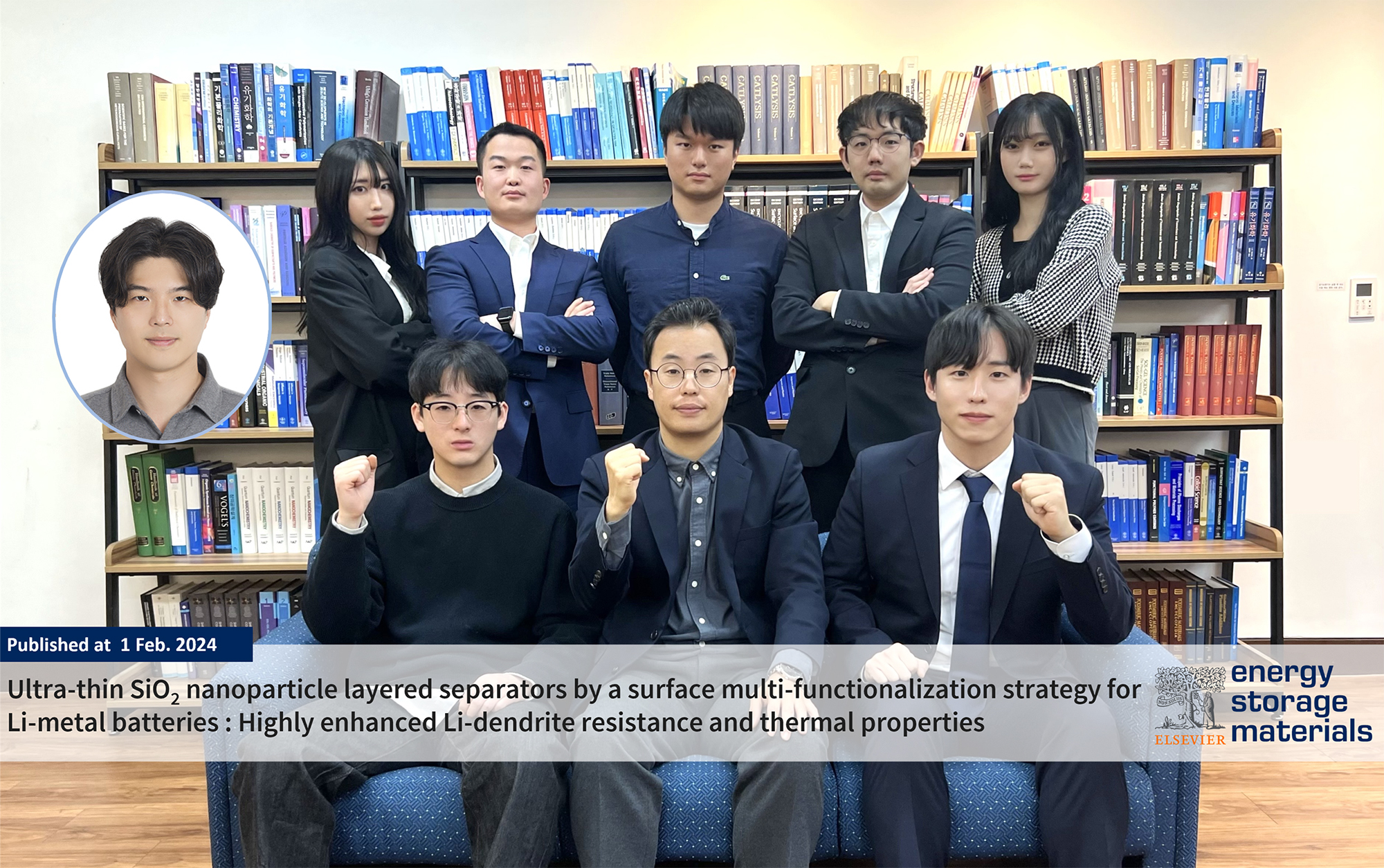커뮤니티
부경투데이
- 국립 부경대학교의 다양한 모습과 소식을 접하시면 부경대학교가 한번 더 가까워집니다.
| 리튬 금속 배터리 수명·안전 높였다(Increased lifespan and safety of lithium metal batteries) | |||
| 작성자 | 대외협력과 | 작성일 | 2024-02-02 |
| 조회수 | 501 | ||
| 리튬 금속 배터리 수명·안전 높였다(Increased lifespan and safety of lithium metal batteries) | |||||
 |
대외협력과 |  |
2024-02-02 |  |
501 |
국립부경대 조계용 교수팀, 리튬 금속 배터리 수명·안전↑기술 개발
- 배터리 분리막에 초박막 실리카(SiO2) 나노입자 코팅 기술 개발
- 국제학술지 <Energy Storage Materials> 게재

△ 연구팀 사진(윗줄 왼쪽부터 윤정식 교수, 배지우, Kaiyun Zhang, 최경민, 권영제, 이민정, 아랫줄 왼쪽부터 김세훈, 조계용 교수, 박재원).
국립부경대학교 조계용 교수(공업화학전공) 연구팀은 차세대 배터리인 리튬 금속 배터리에 사용되는 리튬 금속 음극의 수명을 늘리고 안전성을 높이는 분리막 코팅 기술 개발에 성공했다고 밝혔다.
국립부경대 조계용 교수와 박재원 석사 연구원, 권영제 박사과정생, 인천대 윤정식 교수(에너지화학공학과) 등으로 구성된 연구팀은 리튬 금속 음극에서 리튬 덴드라이트 형성을 억제하는 분리막의 계면 제어 기술을 개발했다.
연구팀은 폴리프로필렌 분리막에 불소계 고분자를 이용해 표면 개질 및 초박막 실리카(SiO2·이산화규소) 나노입자 코팅을 통해 리튬 금속 배터리의 안전 문제를 위협하는 리튬 덴드라이트(dendrite?나뭇가지 모양 결정체) 형성을 억제하는 데 성공했다.
리튬 금속 음극은 리튬 배터리의 높은 용량을 구현할 수 있는 차세대 음극으로 주목받고 있지만, 리튬 금속 표면에서부터 발생하는 덴드라이트가 급격한 수명 열화를 초래할 뿐만 아니라, 분리막을 관통해 전지 열폭주의 원인이 돼 화재로 이어지는 위험성이 있다.
현재 리튬 덴드라이트 억제 관련 연구가 활발히 진행되고 있지만, 기존 바인더를 이용한 무기 입자 코팅의 경우 코팅층이 불균일하게 형성되거나 초박막 형성이 어렵고, 무기 입자의 탈리(脫離) 등 문제가 있었다. 조계용 교수팀은 불소계 고분자를 기반으로 분리막의 계면 제어를 통해 실리카 나노입자를 매우 얇으면서 균일하게 코팅시키는 방법을 개발해 냈다.
이번에 개발한 초박막 SiO2 나노입자 코팅층은 매우 얇으면서(약 200 nm) 높은 밀도로 균일하게 코팅됐으며, 이는 분리막을 통과하는 리튬 이온의 수송을 균일하게 만들어 국소적인 리튬이온의 부족으로 발생하는 과전압에 따른 덴드라이트 성장을 억제했다. 실리카 나노입자 코팅을 통해 기계적 물성 향상뿐만 아니라 고온(140°C)에서 분리막의 열 수축을 억제해 분리막의 우수한 고온 안전 특성도 보였다.
이번 연구 논문의 제1 저자 박재원 연구원은 “차세대 리튬 금속 전지용 고성능 분리막 개발로 이차전지의 주요 이슈인 안전 문제를 해결하고, 리튬 금속 음극의 상용화를 앞당기는 데 기여할 수 있을 것으로 기대한다.”라고 밝혔다.
이번 연구는 산업통상자원부와 연구재단의 우수신진연구사업의 지원을 통해 수행됐으며, 연구 결과를 담은 논문 ‘Ultra-thin SiO2 Nanoparticle Layered Separators by a Surface Multi-functionalization Strategy for Li-Metal Batteries: Highly Enhanced Li-Dendrite Resistance and Thermal Properties’는 국제학술지 <Energy Storage Materials>(IF 20.4 / JCR 상위 2.95%)에 2월 1일에 게재됐다. <부경투데이>

△ SiO2 나노입자 코팅을 통한 리튬 금속 음극의 리튬 덴드라이트 억제 모식도.
A research team led by pro. Cho Kie-Yong at PKNU has developed technology to increase the lifespan and safety of lithium metal batteries
- developed ultra-thin silica (SiO2) nanoparticle coating technology for battery separators
- published in the international academic journal <Energy storage materials>
The research team led by professor Cho Kie-Yong (industrial chemistry) at Pukyong National University announced that they had succeeded in developing a separator coating technology that increases the lifespan and safety of lithium metal anodes used in lithium metal batteries, the next generation of batteries.
The team, which includes professor Cho Kie-Yong at Pukyong National University, master's researcher Park Jae-Won, doctoral student Kwon Young-Je, and professor Yoon Jeong-Sik (department of energy and chemical engineering) from Incheon national university, developed an interface control technology for the separator that suppresses the formation of lithium dendrites in lithium metal cathodes.
They succeeded in suppressing the formation of Li-dendrites, which threaten the safety of lithium metal batteries, by modifying the surface of a polypropylene separator using fluorine-based polymers and coating it with ultra-thin silica (SiO2, silicon dioxide) nanoparticles.
Lithium metal cathode is attracting attention as a next-generation cathode that can realize the high capacity of lithium batteries. However, dendrites that occur on the surface of lithium metal not only cause rapid deterioration of lifespan, but also penetrate the separator and cause thermal runaway of the battery, which poses a risk of fire.
Currently, related research on the suppression of lithium dendrites is actively underway, but in the case of inorganic particle coating using existing binders, there were problems such as uneven formation of the coating layer, difficulty in forming an ultra-thin film, and detachment of inorganic particles. Professor Cho Kie-Yong's team developed a method to coat silica nanoparticles very thinly and uniformly by controlling the interface of the separator based on fluorine-based polymers.
The ultra-thin SiO2 nanoparticle coating layer developed by the research team this time is very thin (about 200 nm) and uniformly coated at high density. This makes the transport of lithium ions through the separator uniform, reducing overvoltage caused by a local lack of lithium ions, and it was shown that the growth of dendrite was suppressed. Coating with silica nanoparticles not only improved the mechanical properties, but also suppressed thermal shrinkage of the separator at high temperatures (140 °C), showing excellent high-temperature safety characteristics of the separator.
Researcher Park Jae-Won, the first author of this research paper, explained, "I expect that by developing a high-performance separator for next-generation lithium metal batteries, we will be able to solve the safety problem, which is a major issue in secondary batteries, and contribute to accelerating the commercialization of lithium metal anodes."
The research was supported by the support project for doctoral level researchers of the Ministry of trade, industry and energy and the National research foundation of Korea, and the paper containing the research results, 'ultra-thin SiO2 nanoparticle layered separators by a surface multi-functionalization strategy for Li-metal batteries: highly enhanced Li-dendrite resistance and thermal properties' was published on February 1 in the international academic journal <Energy storage materials> (IF 20.4 / JCR top 2.95%). <Pukyong Today>